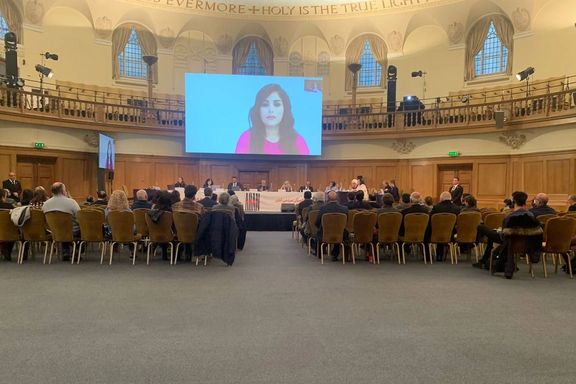Violence Against Iran Protesters In 2019 Was 'Crime Against Humanity’

An expert witness testified at the Iran Atrocities Tribunal in London Saturday that a crime against humanity was committed during protests in November 2019.

An expert witness testified at the Iran Atrocities Tribunal in London Saturday that a crime against humanity was committed during protests in November 2019.
Robert Heinsch, an associate professor of international law at Leiden University, told the tribunal, set up by non-governmental organizations that the number of people killed in the 2019 protests in Iran following a hike in gasoline prices was probably higher than the 304 reported by Amnesty International. Heinsch said using witness testimonies, he and his associates have concluded that the brutal and lethal crackdown could not have occurred without intent and was "crime against humanity".
Crimes against humanity, developed primarily through customary international law, relate to systematic or widespread attacks. Prosecutions have included the Nuremberg trials of the Nazi leaders, the International Criminal Tribunal for the former Yugoslavia, and the International Criminal Tribunal for Rwanda – all of which dealt with mass killings.
In the Saturday session of the tribunal, activist Fatemeh Khoshrou alleged that security agents who used "the most obscene insults against her” when arresting her, had “filled her mouth and nose with pepper spray for insulting the supreme leader."
Khoshrou also claimed she had been sexually assaulted and threatened with rape at a detention center belonging to the Revolutionary Guards in Khorramabad, western Iran, to force her to confess “to taking money from foreign powers.”
‘Witness 173,’ introduced as ‘Soheil Abdi,’ told the tribunal that he had been shot at close range by a “security agent” in Shahriyar, a small town south of Tehran. Abdi denied he was carrying a weapon, "not even a stone,” and said he was merely recording on his smartphone.
Abdi presented as evidence a video of himself being shot, which he said proved he was no threat to the police or others. "I wasn't there to create insecurity, I was there to protest,” he said, insisting he had been shot “before any places were set on fire or damaged.”
Another witness, introduced as ‘Witness 28,’ said she lost his brother during the protests. She claimed security forces had told her family that state television wanted to interview them and describe her brother as a martyr of the Islamic Republic. "We said our brother is a martyr, but he is a martyr for his homeland, a martyr for Iran, not a martyr of the regime."
When asked by the panel why the family refused the "martyr" status, Witness 28 said the Martyrs Foundation only served its own interests and that even those who were martyred during the Iran-Iraq War (1980-1988) had sacrificed their lives for their countrymen, not the Islamic Republic.
Panel member Hamid Sabi clarified to the tribunal that martyr in Iran means someone who has died for Islam which is why many families of the November 2019 victims have refused to accept their deceased family members to be designated as martyrs.
‘Witness 5’ told that a 19-year-old who died at home had not dared to go to hospital for treatment. "His friends were too scared to take him to hospital,” Witness 5 said. The witness added that Revolutionary Guards and Basij militia, and not protestors, had set fire to gasoline stations in order to blame protesters and justify acting against them.